
Paul Valentin Ngobo has been Minister of Agriculture, Livestock and Fisheries since May 2021. While agriculture in the broadest sense is one of the six priorities of the 2022-2026 National Development Plan (NDP), Paul Valentin Ngobo must act for food security, contribute to job creation in the agricultural sector and food safety.
Born in Fort Rousset, now Owando, on October 3, 1970, Paul Valentin Ngobo has been a university professor since 2014. An associate professor of management sciences since 2001, he was - until his appointment in 2021 - a professor at Paris Dauphine University.
This academic was already well-known among agricultural stakeholders through his project: Congo Agricultural Incubator (IAC). A graduate of Management Sciences, Paul Valentin Ngobo made the mechanization of agriculture one of his priorities in order to make Congo one of the leading agricultural powers in Central Africa. Renowned for his tenacity, he is committed to making the agricultural sector attractive to young people by establishing incubators, a source of employment and income.
Paul Valentin Ngobo's mission is to establish protected agricultural zones (ZAP) in the country's twelve departments in order to reverse the massive import of agricultural products. The government of the Republic of Congo imports more than 700 billion CFA francs worth of food, demonstrating the low domestic productivity due to the country's low level of agro-industrialization. The development of agriculture aims to create the conditions for food security, reduce imports, and reduce the unemployment rate from more than 11% to 6% thanks to the jobs created.
To establish ZAPs, the Ministry of Agriculture provides agricultural groups with hectares of prepared land, housing and storage facilities, and equipment. Since the launch period of September 2021, the state has been purchasing harvests from these groups. The strategy, implemented in terms of crop production, livestock farming, and even fish farming, is thus beginning to yield results.
The ministry's actions are linked to food security, import reduction, and economic diversification. The challenge will certainly be met, given the enormous potential this sector offers in Congo.
Paul Valentin Ngobo emphasizes the importance of promoting sustainable agricultural practices to complement the development of the country's fish farming sector. By encouraging organic food production, he aims to meet growing consumer demand for healthy products while creating new economic opportunities for farmers. Organic farming also offers significant environmental benefits. It promotes the conservation of water resources, the preservation of soil fertility, and the reduction of erosion. The minister emphasizes training young people in organic farming, which will strengthen Congo's capacity to produce healthy food.
According to the latest monitoring report on the economic and financial situation of the Republic of Congo, published by the World Bank, by protecting its population and the vital agricultural sector against the effects of climate change, the Congo will also promote the construction of a sustainable, resilient and inclusive economy.



